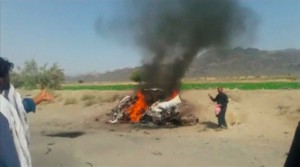Senior Afghan Taliban figures were meeting on Monday to agree on a successor to Mullah Akhtar Mansour, the leader of the militant movement who U.S. President Barack Obama confirmed had been killed in an American air strike at the weekend
The Taliban have so far made no official statement on the fate of Mansour, who assumed the leadership only last year.
But senior members have confirmed that their main shura, or leadership council, has been meeting to discuss the succession in a bid to prevent factional splits from fragmenting the movement.
Obama, on a three-day visit to Vietnam, reiterated support for the Western-backed government in Kabul and Afghan security forces, and called on the Taliban to join stalled peace talks.
The president authorized the drone strike that killed Mansour in a remote region just on the Pakistani side of the border with Afghanistan on Saturday, and Afghan authorities have said the mission was successful.
But U.S. officials held back from confirming that the Taliban leader had been killed in the attack until intelligence had been fully assessed.
Pakistani authorities have said the drone strike was a violation of the country’s sovereignty, but reaction from Islamabad has otherwise been relatively muted and a number of questions remain over what exactly happened.
A Pakistani passport in the name of Wali Muhammad, which Pakistani authorities said contained a visa for Iran, was recovered near the scene of the attack and is believed to have belonged to Mansour.
But it is unclear what he may have been doing in Iran and why he was apparently traveling in Pakistan without a security detail.
A spokesman for the Iranian foreign ministry was quoted on state media denying that such an individual had crossed the border from Iran to Pakistan at the time in question.
Calling the death “an important milestone”, Obama said Mansour had rejected peace talks and had “continued to plot against and unleash attacks on American and Coalition forces”.
“The Taliban should seize the opportunity to pursue the only real path for ending this long conflict – joining the Afghan government in a reconciliation process that leads to lasting peace and stability,” he said.
However, he stressed that the operation against Mansour did not represent a shift in U.S. strategy in Afghanistan or a return to active engagement in fighting, following the end of the international coalition’s main combat mission in 2014.
The U.S. currently has 9,800 troops in Afghanistan, divided between a NATO-led mission to train and advise local forces and a separate counterterrorism mission fighting militant groups such as Islamic State and al Qaeda.
A decision is expected later this year on whether to stick with a timetable that would see the number of troops cut to 5,500 by the start of 2017.
CAN TALIBAN UNITE?
The Taliban, which have previously rejected ouvertures to join talks with President Ashraf Ghani’s government, have been pushing Afghan security forces hard since the launch of their spring offensive in April, but the attack on Mansour is likely to disrupt operations, at least temporarily.
Although some individual Taliban members have been quoted in media reports saying that Mansour was killed, the group’s leadership, keenly aware of the need to limit splits, has not issued its own confirmation.
“The leadership is being very careful because one wrong step could divide the group into many parties like former mujahideen,” one Taliban official from the eastern province of Nangarhar said, referring to guerrilla leaders who fought the Soviets in the 1980s before splitting into warring factions.
Serious divisions emerged last year when it was confirmed that Mullah Mohammad Omar, the group’s founder, had been dead for two years, leaving his deputy Mansour in effective charge of the movement and open to accusations he deceived his commanders.
One senior member of the shura, which is based in the western Pakistani city of Quetta, said that the choice for the next leader appeared to be shaping around Mansour’s deputy, Sirajuddin Haqqani, or a member of the family of Mullah Omar, such as his son, Mullah Mohammad Yaqoob.
Haqqani, leader of an affiliated network blamed for a series of high-profile suicide attacks in Kabul, had the backing of Pakistan, while Yaqoob had support among members of the Afghan Taliban, the shura member said.
“We prefer someone from Omar’s family to put an end to all internal problems,” he said.
huffingtonpost.com



